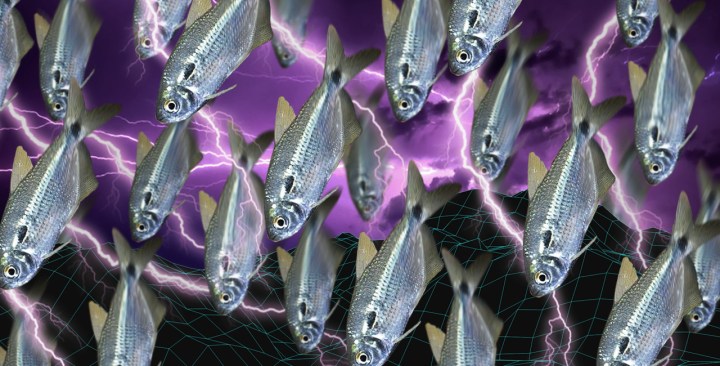What’s Behind Honduras’ Lluvia de Peces? Depends On Who You Ask

Art by Alan López
At least once in a year in Yoro, Honduras, fish are said to fall from the sky. This natural phenomenon – known as Lluvia de Peces – occurs in early spring or late summer. And while Yoro is most known for the raining fish, no one has really seen it happen. The Lluvia de Peces is accompanied by heavy rains, thunder, and lightning. It’s so severe that people stay inside, but when it’s over, they head outside with a variety of containers and bags and collect the small silver fish that have fallen from the sky. The New York Times recently investigated what’s behind the rain and learned that answers differ depending who you ask.
One theory is that the fish are sucked up from neighboring bodies of water, or even the Atlantic Ocean (though it is about 45 miles away from the city) into Yoro. Yet, this doesn’t explain why it occurs in the same spot year after year. There are others who believe that heavy rains cause underground streams or caverns to flood, bringing the fish to the surface. When the storm is over and the water clears out, fish are what’s left on the streets.
But for many who live there, the reasoning is completely different. Legend has it that back in the mid-1800s, Manuel de Jesús Subirana – a Catholic missionary from Spain – prayed to God for help feeding residents of the area. Not long after, the Lluvia de Peces reportedly began. Audelia Hernández González, a pastor from one of the region’s evangelical church, calls it a blessing from the heavens. “Look, people who are least able to eat fish can now eat fish,” she said. Family members look out for those who are unable to collect the fish.
Regardless of what the true answer is, for Yoro’s residents, the Lluvia de Peces is a source of pride. “When we identify ourselves, we say, ‘I’m from the fish rain place,'” Luis Antonio Varela Murillo said. “What we don’t like is that a lot of people don’t believe it. They say it’s pure superstition.”